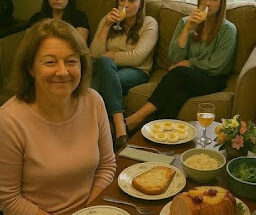I grew up on a sweet potato farm, about ten miles outside of town, where mornings begin before the sun peeks over the horizon, and “vacation” means a trip to the county fair. My parents wear dirt under their nails and possess more grit than anyone I know. I used to believe that was enough for people to respect us.
Then, everything changed when I got accepted into a prestigious scholarship program at a private high school in the city. It was supposed to be a significant opportunity, a big break. But on my first day, I walked into homeroom wearing jeans that still carried the faint scent of the barn. As I settled in, a girl with a glossy ponytail leaned over and whispered, “Ew. Do you live on a farm or something?”
I didn’t respond; I just sat down and kept my head low. I tried to convince myself I was imagining things. But the comments kept coming. “What kind of shoes are those?” “Wait, so you don’t have WiFi at home?” One guy even asked if I rode a tractor to school.
I kept my mouth shut, buried myself in my studies, and never mentioned my home. But inside, I wrestled with a sense of shame. Back on the farm, I’m not just “that farm girl.” I’m Mele. I know how to patch a tire, wrangle chickens, and sell produce like nobody’s business. My parents built something real with their hands. Why did I feel compelled to hide that?
The turning point came during a school fundraiser. Everyone was supposed to bring something homemade to sell. Most kids showed up with cookies from a box or crafts their nannies had helped them make. I brought something special: sweet potato pie—our family’s cherished recipe. I made six pies and sold out within just twenty minutes.
That’s when Ms. Bell, the guidance counselor, pulled me aside. “Mele,” she started, but before she could finish, someone unexpected approached us. It was Izan—the guy everyone liked. Not because he was loud or flashy; he had a calm, confident presence. His dad was on the school board, his shoes were always spotless, and he genuinely remembered people’s names. Including mine.
“Hey, Mele,” he said, glancing at the empty pie plates. “Did you really make those yourself?”
I nodded, uncertain about where this was going.
He grinned. “Think I could get one for my mom? She loves anything sweet potato.”
I blinked in surprise. “Uh, yeah, sure. I can bring one on Monday.”
Ms. Bell shot me a knowing smile, as if to say, “Told you so.” Then she added, “This pie? It’s a piece of who you are. You should be proud to share more of that.”
That night, I stayed up late, contemplating not just Izan but all the times I had hidden my roots, thinking they made me smaller. What if, instead, they made me stronger?
So, on Monday, I didn’t just bring one pie. I brought flyers, too. I created a name—Mele’s Roots—and passed out slips that read, “Farm-to-table pies, fresh every Friday. Ask about seasonal flavors.” I thought maybe a few kids would be curious.
By the end of lunch, I had twelve pre-orders and a direct message from someone named Zuri asking if I could cater her grandma’s birthday party.
Things escalated quickly after that. Teachers began asking if I could prepare mini pies for staff meetings. One girl even offered to trade me a designer jacket for three pies (I politely declined; it was ugly).
But what truly amazed me was when Izan sent me a photo of his mom holding a fork mid-bite, her eyes wide with delight. The caption read, “She says this is better than her sister’s—and that’s a big deal.”
I burst into laughter. My dad looked over and asked, “Is that a good thing or a bad thing?”
“Very good,” I replied, grinning. “I think we might be expanding.”
We began baking together every Thursday after my homework. Sometimes we made pies, other times biscuits or bread. I learned more about our family’s recipes than I ever had before. I started incorporating those stories into school presentations and essays—talking about the land, my grandparents, and our struggles during drought years.
Slowly, people began to listen.
The girl with the glossy ponytail? She asked me for a recipe. I handed her a simplified version—there was no way she’d be using a wood-fired oven—but it felt good to share.
In my senior year, when we had to do a final project on something that shaped our identity, I decided to make a documentary-style video about our farm. I filmed my mom washing carrots in a bucket and my dad feeding the dogs crusts from the bread he baked. I concluded with footage of me at the county fair, standing proudly next to my little stall of pies under a hand-painted sign.
When they played it in front of the entire school, I felt a wave of terror wash over me. I stared at the floor the whole time. But when it ended, the applause was thunderous. A few students even stood up.
Afterward, Izan came over and gave me a side hug. “Told you your story mattered.”
I smiled back, feeling the weight of his words. “It took me a while to believe it.”
The truth is, I used to think people wouldn’t respect me if they knew where I came from. Now I realize that you teach people how to see you. When you own your story, it transforms into your power—not your shame.
So yes, I’m a farmer’s daughter. And that doesn’t make me less; it makes me rooted.



